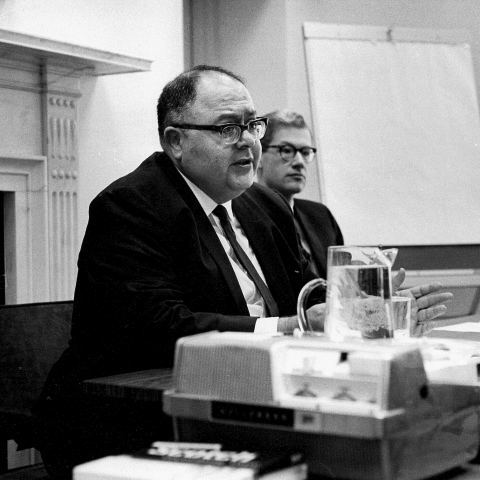Why is Donald Trump levelling across-the-board tariffs? Does he have Australia in his sights? I have spent the week in Washington speaking to some of his economic, national security and political advisers, and have received many different answers. No one person has given me a complete explanation. But this is my assessment of what is going on and how it might play out.
First some context. Trump is not a traditional Republican internationalist, but neither is he an isolationist nor a nativist. He wants to maintain and entrench American primacy and leadership, but not in the way we have become accustomed to since the 1990s. The questions we must ask are how does he believes he is enhancing American power and reimagining its place in the world, and what does it mean for us?
Before getting to the executive order signed on February 10 imposing 25 per cent tariffs on steel and aluminium imports, it is important to understand how Trump thinks about American economic power and standing. The US is the largest economy in the world, the most innovative and technologically advanced, underwrites global capital markets and has the only genuine international currency in circulation.
However, its economic primacy is threatened because its industrial base has greatly diminished as production shifts elsewhere. Other economies, especially China, are transferring or stealing American technology and know-how to benefit their own firms and make a killing from selling into the huge American consumer economy. Allies are indulgently relying on American power and resources to guarantee their security to pursue their own national interests, not all of which are aligned with America’s.
This provides some background for Trump’s interest in reversing trade deficits and emphasis on stock market prices. Both are treated as indicators of problems and of progress. Obsessed with pursuing relative rather than absolute gains, he sees deficits as a sign that America is getting a poorer deal from the overall economic exchange. A booming sharemarket is evidence of confidence in America’s future and affirmation that his approach is working.
This brings us to tariffs. Put aside specific measures against China because the competition with China is in its own category. The only consensus between his economic, security and political advisers is that China is the biggest and most systemic challenge for America. If not for China, the geopolitical and economic problems confronting America would be small fry.
What about the rest of us? Some tariffs will be used as a coercive negotiating tool over specific issues, as Trump is doing with Canada and Mexico. He might do the same with Australia down the line when it comes to forcing us to increase our defence spending and commitments.
In the case of supporting US domestic production of steel and aluminium, these are two sectors that Trump and some of his advisers have identified as critical for the reinvigoration of American industry and economic security. Computer chips and semiconductors, as well as pharmaceuticals, are some others. The list of strategic sectors will only grow.
In this context, Trump believes the unmatched size and depth of the American domestic market provides leverage that has not been adequately valued and exploited by his predecessors.
Friends and foes alike must respect and support his objectives if they seek to benefit from selling to America. These objectives include re-industrialisation of the US homeland, increasing wages for lower and semi-skilled workers, and even fiscal revenue raising. He likes tariffs because he believes other economies have no choice but to continue to sell into the enormous American market.
A chorus of economists will protest that tariffs will not achieve these ends. Trump doesn’t seem to care. The cost of labour inputs in the form of higher American wages will increase as will foreign intermediary inputs, but the theory is that lower energy prices and massive deregulation will keep production costs and therefore inflation down.
For Trump, American trading partners in Europe and Asia have long protected their own economies using tariffs and other means to achieve similar ends. He will do the same.
Regarding steel and aluminium tariffs, Australia does not import so much into America that local producers are crowded out. Why was Australia singled out? Because some in the White House are resentful Australia managed to extract an exemption the last time, only to increase its imports. It doesn’t matter that the increase was not significant – it is about the principle, rather than the effect.
Should and will Australia gain an exemption this time? White House advisers seem divided on this issue. On the one hand, we are an increasingly important ally, have a trade deficit with the US, and the economic benefits to America of our exports are demonstrable. On the other, it has been scornfully noted that we benefit greatly from Chinese state-led industrial policies that inflate excess fixed investment and production, both of which are damagingly distortive in a global and systemic sense – and have therefore been reluctant to support the US in calling China out on these. We have Washington champions, but also detractors.
Some White House advisers seem to want trading partners to experience the pain of tariffs before there is any negotiated relief as a psychological move to normalise them and enhance America’s bargaining position.
My gut feeling is that Australia will eventually gain some partial and conditional exemptions, but not before the tariffs begin.













